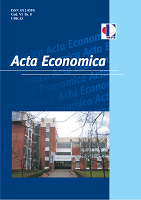МЈЕСТО И УЛОГА НАУЧНО-ИСТРАЖИВАЧКИХ ИНСТИТУЦИЈА У РС/БИХ У ПРОЦЕСУ ЕУ ИНТЕГРАЦИЈА
THE PLACE AND ROLE OF INSTITUTIONS FOR SCIENTIFIC RESEARCH IN RS\BIH IN THE PROCESS OF EU INTEGRATIONS
Author(s): Jugoslav JovičićSubject(s): National Economy, Economic policy, Government/Political systems, Developing nations, EU-Accession / EU-DEvelopment, Socio-Economic Research
Published by: Економски факултет Универзитета у Бањој Луци
Keywords: institutions for scientific research; integrations; reforms; economic development;
Summary/Abstract: Numerous challenges in economic and political field are before the European Union, and those could be sublimed in thesis that the economy of the Union must achieve higher degree in competitiveness in relation to economy of USA, Japan and giants from East: China and India. Therefore various political documents are adopted at level of European Union, such as Lisbon Strategy of Growth and Employment which, among the other issues, defines clearly the role of science and higher education in EU for period until 2010. These proclaimed political aims will be realised through coordinated and harmonised politics and legislation within these fields, and there are created a special financial mechanisms such as Seventh Framework Programme of EU which should accelerate and support the realisation. There raised a question what are all these reform for? The final result of the applied reforms should be one open European market where there will be no obstacles for educated and qualitative labour, and the education and scientific researches should be “a pillar” for fluctuation of labour and strengthening of the European economy. Simply, Europe wants to create economy that will be the most dynamic the most competitive in the world till 2010, and which will be based on knowledge and innovations. Certainly, there is a question what is the role of scientific educational communities in RS/B&H in this dynamic process of European integrations, gaining the status of country-candidate for EU membership and in creation of new system of European values. Are the local research and educational institutions capable to take the role of leader in the integration processes in B&H? Is the sector of science and higher education in RS and B&H in focus of local political leaders at all, as it is a case in Europe and is this sector expected to lead society towards progress and development? Do Western Balkans and Bosnia Herzegovina have their own “Lisbon Strategy of Growth and Development” as counterpart of the European version of strategy for socioeconomic development? It is not easy to answer all these questions, so before trying to answer them even partially, it is necessary to analyse shortly former activities of local academic institutions in the field of European integrations and participation in various European programmes and funds.
Journal: Acta Economica
- Issue Year: 7/2009
- Issue No: 10
- Page Range: 295-311
- Page Count: 17
- Language: Bosnian, Croatian, Serbian

